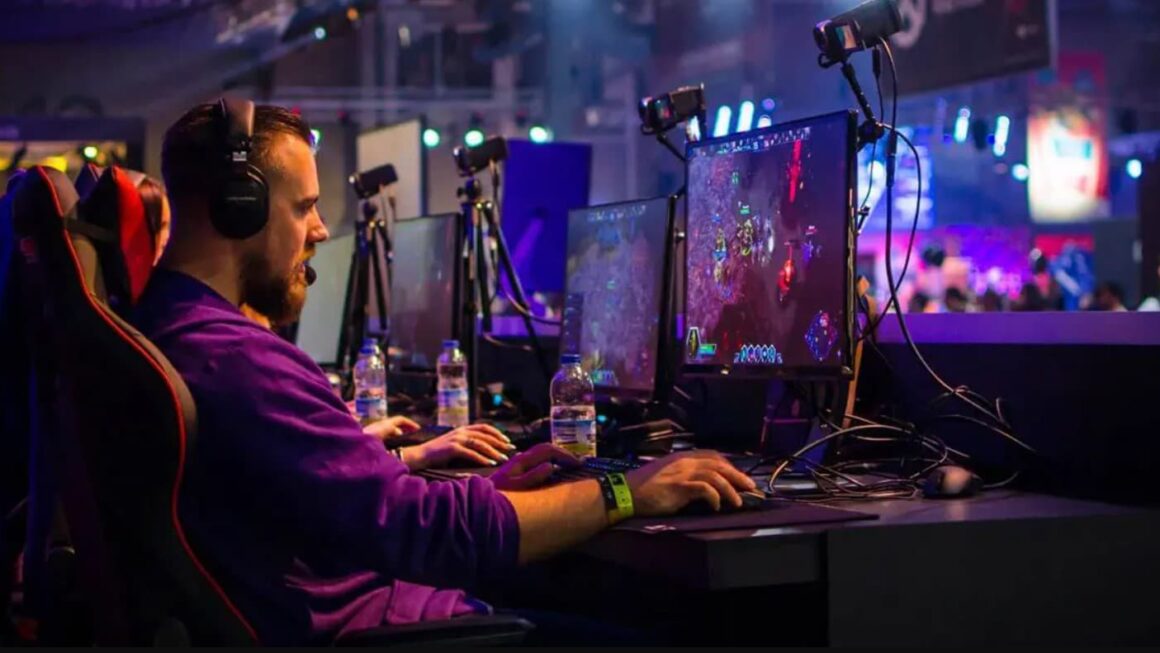Social gaming refers to the concept of playing video games with or against other players in a shared online environment. Multiplayer online games, as the name suggests, are video games that allow multiple players to interact and engage with each other simultaneously over the internet or a local network. These games are designed to foster social interactions, cooperation, and competition among players, creating a unique and engaging gaming experience.
The rise of social gaming has been a remarkable phenomenon in the gaming industry. What once started as a niche activity has evolved into a global phenomenon, attracting millions of players from diverse backgrounds and age groups. With the advent of high-speed internet and the proliferation of online gaming platforms, multiplayer online games have become increasingly accessible and popular.
The appeal of social gaming lies in its ability to connect people from around the world, allowing them to forge new friendships, collaborate on challenges, and engage in friendly rivalries. These games have transcended the traditional boundaries of gaming, becoming a means of social interaction, entertainment, and community building.
As the demand for social gaming experiences continues to grow, game developers and publishers have responded by investing heavily in developing innovative multiplayer games and online gaming platforms. From massive multiplayer online (MMO) games to battle royale and competitive multiplayer titles, the social gaming landscape has become incredibly diverse, catering to a wide range of gaming preferences and interests.
The Appeal of Social Gaming
One of the primary appeals of social gaming lies in the cooperative gameplay mechanics and team-based challenges. Many multiplayer online games revolve around players working together to achieve common goals, overcome obstacles, and conquer challenging content. This collaborative aspect fosters a sense of camaraderie and teamwork, as players must coordinate their efforts, communicate strategies, and rely on each other’s strengths to succeed.
In games like World of Warcraft, Final Fantasy XIV, or Destiny, players form parties or raids to take on formidable bosses and complex dungeons. Successful completion of these challenges often requires a high level of coordination, communication, and trust among team members. This shared experience of overcoming difficulties together creates a strong bond and a sense of accomplishment that resonates with players on a deeper level.
Social interaction and communication features
Multiplayer online games are designed to facilitate social interaction and communication among players. Most games incorporate various features that enable players to connect and communicate seamlessly, such as voice chat, text chat, and emotes. These communication tools allow players to strategize, coordinate, and even engage in casual conversation, fostering a sense of community and social connection.
Additionally, many games offer built-in social features like guilds, clans, or player communities. These virtual hubs enable players with shared interests to come together, organize events, and build lasting relationships. The ability to interact and socialize with like-minded individuals contributes significantly to the appeal of social gaming, creating a welcoming and inclusive environment for players to engage with one another.
Shared experiences and forming online communities
Beyond the gameplay itself, social gaming offers players the opportunity to share experiences and form online communities. As players embark on virtual adventures together, they create shared memories, inside jokes, and a sense of belonging to a larger community. These shared experiences often transcend the boundaries of the game itself, fostering lasting friendships and connections that extend into other aspects of players’ lives.
Online gaming communities serve as platforms for players to discuss strategies, share achievements, and build camaraderie. Forums, social media groups, and dedicated websites allow players to connect with others who share their passion for a particular game or gaming genre. These communities provide a space for players to seek advice, share tips, and even organize real-world meetups or gaming events, further strengthening the social bonds formed through gaming.
Popular Social Gaming Platforms and Games
Massive Multiplayer Online (MMO) games
- World of Warcraft
- Final Fantasy XIV
- Guild Wars 2
Massive Multiplayer Online (MMO) games are among the most popular and well-established genres in social gaming. These games are characterized by persistent virtual worlds that can accommodate thousands, or even millions, of players simultaneously. They offer a rich and immersive gaming experience, combining storytelling, character development, and cooperative gameplay.
World of Warcraft: Developed by Blizzard Entertainment, World of Warcraft is one of the most iconic and influential MMOs in gaming history. Since its release in 2004, it has captivated millions of players worldwide with its vast and detailed fantasy world, engaging storylines, and challenging group content. Players form guilds, embark on epic quests, and engage in large-scale raids, fostering a strong sense of community and social interaction.
Final Fantasy XIV: Square Enix’s Final Fantasy XIV is a critically acclaimed MMO that immerses players in the rich and immersive world of Final Fantasy. With its stunning visuals, engaging storyline, and diverse content, it has garnered a dedicated following of players who explore the game’s vast landscapes, undertake challenging dungeons and raids, and participate in a thriving player economy and crafting system.
Guild Wars 2: ArenaNet’s Guild Wars 2 is known for its action-oriented combat system, dynamic events, and a strong emphasis on cooperative gameplay. Players can join guilds, participate in large-scale world vs. world battles, and tackle challenging group content. The game’s strong community and frequent updates have contributed to its enduring popularity within the MMO genre.
Battle Royale games
- Fortnite
- Apex Legends
- PlayerUnknown’s Battlegrounds (PUBG)
The battle royale genre has taken the gaming world by storm in recent years, offering intense multiplayer experiences that combine survival, strategy, and fast-paced action. These games typically pit a large number of players against each other in a last-player-standing scenario, creating a highly competitive and social gaming environment.
Fortnite: Epic Games’ Fortnite is undoubtedly one of the most popular battle royale games in the world. With its distinct building mechanics, vibrant visuals, and frequent content updates, Fortnite has amassed a massive player base, including casual gamers and professional esports athletes. Players can team up with friends, communicate strategies, and engage in intense battles, fostering a strong sense of social interaction and community.
Apex Legends: Developed by Respawn Entertainment, Apex Legends is a character-based battle royale game that combines fast-paced gameplay with unique character abilities and team-based tactics. Players must coordinate with their squad, communicate effectively, and work together to outmaneuver and outlast their opponents, creating a highly social and dynamic gaming experience.
PlayerUnknown’s Battlegrounds (PUBG): PUBG, created by Brendan Greene, was one of the pioneers of the battle royale genre. With its realistic graphics, intense gameplay, and a focus on tactical decision-making, PUBG has garnered a dedicated following of players who value teamwork, communication, and strategic thinking in their multiplayer battles.
Social Connections and Community Building
While social gaming primarily takes place in virtual environments, it has proven to be a powerful catalyst for forming meaningful friendships and relationships in the real world. Many players have discovered that the bonds they forge while gaming extend far beyond the confines of the game itself.
Through shared experiences, collaborative efforts, and the exchange of personal stories, players often develop a deep sense of camaraderie and trust with their fellow gamers. These connections can transcend geographical boundaries, cultural differences, and age gaps, creating a diverse and inclusive community united by a common passion for gaming.
Furthermore, the social dynamics of multiplayer games can foster romantic relationships, as players connect on a deeper level through their shared interests and experiences. Some players have even met their significant others through online gaming communities or at gaming conventions, demonstrating the profound impact that social gaming can have on personal connections.
Online gaming communities and forums
Online gaming communities and forums play a crucial role in fostering social connections among players. These platforms serve as virtual gathering places where gamers can discuss strategies, share tips, and engage in lively conversations about their favorite games.
Gaming forums and subreddits provide a space for players to seek advice, troubleshoot issues, and connect with like-minded individuals who share their passion for specific games or gaming genres. These communities often extend beyond the games themselves, with players organizing events, sharing fan art, and discussing gaming culture and industry news.
Additionally, many gaming communities have dedicated social media groups or Discord servers where players can engage in real-time conversations, coordinate gaming sessions, and build lasting friendships with fellow gamers from around the world.
Social gaming events and conventions
Social gaming has also given rise to a vibrant culture of gaming events and conventions, where players can physically come together and celebrate their shared interests. These events provide a unique opportunity for gamers to connect face-to-face, participate in tournaments, attend panels and workshops, and immerse themselves in the larger gaming community.
Conventions like E3, Gamescom, and PAX attract thousands of attendees annually, creating a festive atmosphere where gamers can meet their favorite developers, try out the latest games, and engage in cosplay and other gaming-related activities. These events foster a sense of belonging and reinforce the social bonds formed through online gaming, allowing players to strengthen their connections and create lasting memories.
Moreover, local gaming events, such as LAN parties and esports tournaments, provide opportunities for players to connect with others in their local communities, fostering a sense of camaraderie and friendly competition among gamers within a shared geographic region.



